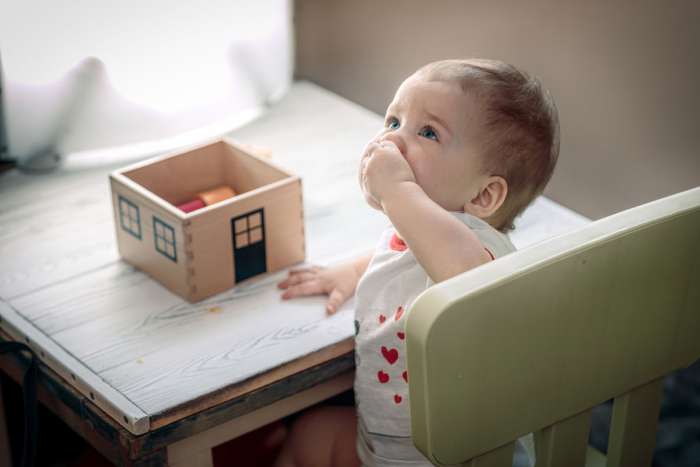In a newly-released study for the American Academy of Pediatrics, (AAP) pediatrician/Motility Fellow Dr. Danielle Orsagh-Yentis explains that kids six and younger are ingesting foreign-body objects (such as coins, toys, jewelry and batteries) more than ever before, during a 20-year time period. In fact, the number has nearly doubled over the past few years.
Using data from the National Electronic Injury Surveillance System, Orsagh-Yentis and her team zeroed in on kids who swallowed a foreign object and were treated in U.S. emergency rooms from 1995 to 2015 (that are on record.) The numbers have certainly increased dramatically, and across all age groups. The most frequently ingested coin was a penny (65.9%) and button batteries were the most common batteries ingested (85.9%). Thanks, technology!
More: Are Gluten-Free Diets Safe for Kids?
What should you do if your child swallows a coin, battery, or plastic item? Two pediatricians share their advice and expertise.
Carefully check toys
Dr. Ashish Goyal, a Hawaii-based Double Board-Certified Pediatrician, CEO of Pediatrics Board Review Inc., agrees with the AAP researchers team that today’s technology plays a huge role in the increased number of children ingesting button (round) batteries.
Is Your Child Ready to Be Left Alone?
Is Your Child Ready to Be Left Alone?How do you know if your child is ready to stay home alone or ride his bike to school? By asking him. Ideally, your child should know the following twelve points before he is ever alone in public. Sit down with your child and talk about each one of the twelve points listed below from Gavin de Becker's book, Protecting the Gift. Read More
“There’s so much more technology around and the number of toys that require batteries today is alarming,” he says. “Many do come with screws, but there are more batteries out there and some small toys aren’t built well; the quality of some toys aren’t good and may have unsafe button batteries that are easier for kids to grab and swallow.”
According to Dr. Goyal, to prevent your child from ingesting a round battery, inspect all toys that come into your home, including anything that your child may win at a fair or arcade.
“Examine all toys carefully. If a toy has a screw cover protecting the batteries, it makes accessing the batteries more difficult. While it’s kind of a pain to get your mini screwdriver kit every time you have to replace a toy’s battery, there is a real need for it. I, as a parent myself, appreciate that.
What To Do If Your Child Swallows a Coin

If your child swallows a battery or a coin, according to Dr. Goyal, immediately take them to the ER. Do not wait, or bring them to a walk-in clinic that may not even have crucial X-ray machinery. “Coins are most common in case of foreign body ingestion. There are certain coins that can potentially be dangerous for the intestinal lining if they get stuck.”
He adds: “Pennies that were minted in 1982 or later have a high zinc component. They are easily seen on X-ray, but are highly reactive with stomach acids. If the penny remains in the stomach and does not pass through, it can start to cause stomach ulcers and abdominal pain.”
What To Do If Your Child Swallows a Round Battery

According to Dr. Goyal, button batteries are usually ‘okay,’ and will “pass through,” as long as they don't get stuck in the esophagus or stomach. “Regardless, take the child to the ER.”
A Warning About Magnets
Magnets can be a problem—swallowing one, may be ‘OK’, if it has nothing to latch on to. Explains Dr. Goyal: “If a child swallows more than one magnet, they can find each other in the intestines, ‘and pinch,’ and that can cause intestinal obstruction.” Again—bring the child to the ER immediately if they ingested small magnets.
What to Do If Your Child Swallows Something Plastic

According to Dr. Joel Gator Warsh, a Southern California-based Functional and Integrative Pediatrician, when a child swallows a small object like a Lego piece, take a quick look in their mouth to see if you can sweep the object out. “If not, and the child is choking and can't breath, perform the Heimlich maneuver. Of course, if that does not work, call 911 immediately.”
Most soft, circular objects are not dangerous to swallow, explains Dr. Warsh, so in general, unless your child is choking, you can just let is pass into the stool.
He adds: “If your child is not choking and it is a small, round, non-sharp object, you can just let it go down and pass through naturally. Give the child some water and have them relax and take deep breaths. Monitor the stool over the next week for the object.”
According to Dr. Warsh, it is extremely important that all parents learn basic CPR.
“If a child places a foreign body in their mouth and chokes on it, they need to have an understanding of how to use the Heimlich maneuver to get it out.”
Overview
Overall, explains Dr. Goyal, “According to the American Academy of Pediatrics, most foreign body ingestions do not cause harm. However, the potential for harm with certain types of ingestion is very real. So, it's great that the AAP is raising awareness and advocating for more research on how we can all prevent related injuries.”
Keep all small items away from kids, especially when they begin crawling, inspect all toys and gadgets, and be sure to ask your pediatrician any questions you may have about swallowing, choking, and CPR.
Oh, and if you haven’t done so yet, enroll in a CPR class today.
For more kids' health and safety news, follow FamilyEducation on Pinterest:


